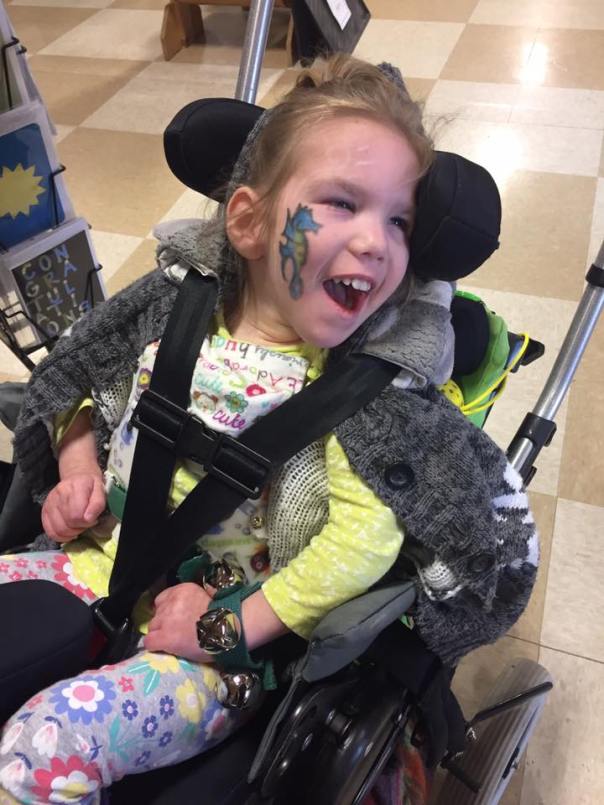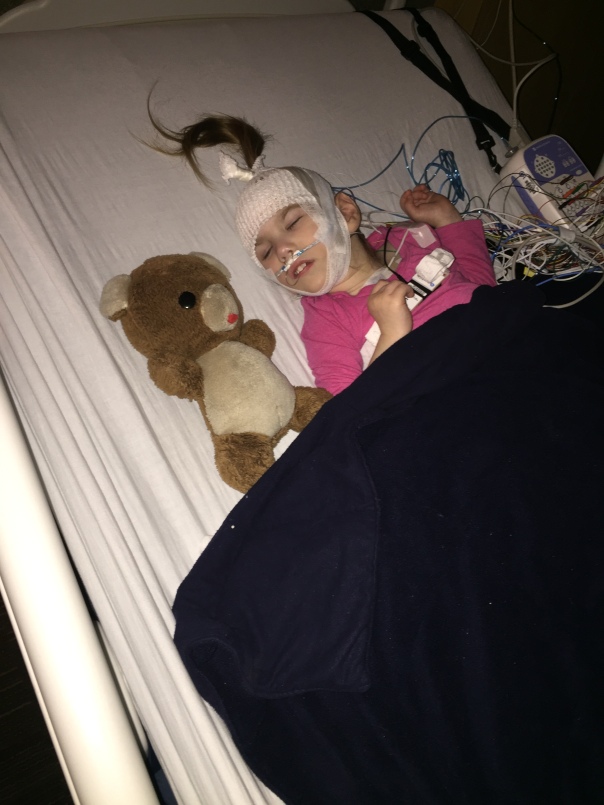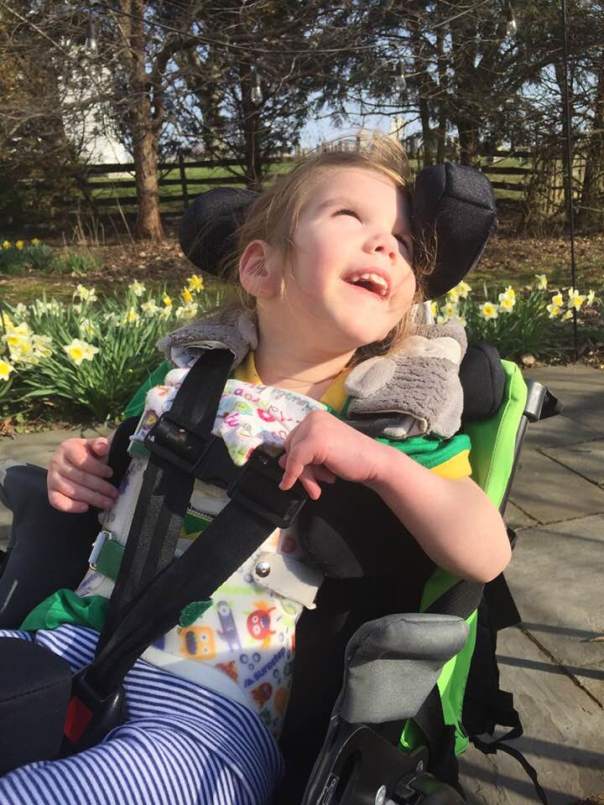As we roll Lucia away from the face painting station on Saturday, a bright blue and yellow seahorse on her flushed cheek, I overhear the student ask the next little girl who’s climbed up into the chair how old she is. “Four,” she replies effortlessly. “Oh, you must be in preschool then?” the woman asks.
Lucia is four. Lucia is in preschool. But she doesn’t climb up on chairs or talk. I rather marvel at the young girl’s speech and motor-skills until I remember that my kid is the one people sometimes describe as “really disabled,” that my kid is the one who’s developmentally behind, delayed, atypical. It’s only in brief dissonant moments like these that I sense that my kid might be “other” to someone else or that our life might be considered atypical, because of course, to me, she’s just another four year-old with face paint, and we’re her parents.

But I’ve often felt like I’ve glimpsed something other-worldly in my daughter when she laughs, because the giggles tumble so uncontrollably out of her taut little body, erupting out of her, they seem to send ripples throughout the room. When we’re in public, I love to catch people, especially otherwise grouchy looking people, finding those giggles downright contagious, moved by the pure joy of the sound of her laughs, the generous, inclusive flash of her wide smile. She lacks words, but in these moments words are obliterated, unnecessary. She can’t really move on her own from her wheelchair and yet when Lucia laughs with true abandon, completely undeterred by anyone else around her, it strikes me that she is uniquely, utterly free.
Earlier that Saturday morning when Lucia and I sit there lazily in the living room, still in a stupor from a sleep study we completed the night before at a hospital an hour away from home, my husband says something astounding. He reminds me, the anthropologist, that the oppressing milestones of developmentalism inflict not just stress, but moral judgment on many a parent. Feeling as though it is up to you to usher your child through life’s varied stages with utmost precision is constraining and exhausting. And by that yardstick, our four year adventure in parenting is one colossal failure.

But then, we’ve also been set free.
We live life and we parent simply for the joy of it all. We don’t worry if we’re doing it right, because all we can do is seek comfort and happiness for our girl. We’re hurt when she hurts, of course, and there are times we wish we could fix things that we can’t. That pain that she feels and that hopelessness that we often feel are not to be understated. And yet, because of all the things we can’t do as parents and perhaps some of the things Lucia can’t do herself, we’re also very free.
We can’t hardly do anything but love her, and so we do, one joy-filled day at a time.
And it’s weird, precisely because Lucia does so little, I feel like it’s easier not to get lost in what she does, but to get to know her for who she is–a generous, patient, gregarious little soul–and it reminds me that none of us are the sum of our accomplishments anyway. So why do we let ourselves treat our kids that way? As if life is mostly gain and growth, when they’re all we’ve ever wanted, just as they are. Maybe it’s because deep down we’re not sure we’re really enough just as we are as people and parents. We could always be doing more, right? We are our own enemies of freedom, our own robbers of joy.
But before you say that we’re extraordinary or that Lucia’s extraordinary (okay, well that may be true!), let me tell you something else: there’s little in life that we actually control and when it comes down to it control is not at all what it’s cracked up to be. What’s extraordinary is that in a world of such chance and circumstance and chaos, we three get to live life together. We get granted these moments of joy and freedom that are other-worldly and grace-filled.
Now as a Christian, I tend to think joy is a gift from God, but whether you’re a person of faith or not, you may be able to agree that joy seems to come from elsewhere and only deigns to nestle itself between people with audacious graciousness–it’s always granted, never earned. That’s the one thing I guess we’ve come to understand about parenting, too. Its freedom is granted, but it also requires our willingness to let go of all the things we think are so important to receive it. I’m sure it may look like many of those things have been stripped from us, wrested from our control in becoming Lucia’s parents, but I just don’t see it that way.

Because when Lucia’s gone, I doubt I’ll remember or cherish how well she stood in her stander, how efficiently she swallowed bites of puree, or even mimicked the sounds of our voices, but I’ll never forget the sound of her laughter. I’ll pine for it, like I pine for nothing else. And I’ll pine for the way that laughter bid me to laugh alongside her, when I wouldn’t have had the courage to laugh with such abandon on my own. Without Lucia, I wouldn’t be a parent. Learning to love Lucia, I, too, have been set free.
Floored. Thank you God for making this beautiful little girl and giving her to the right mama. This is what ministered to me “reminds me that none of us are the sum of our accomplishments anyway. So why do we let ourselves treat our kids that way?” You may seem poor because you do not have in Lucia what I “have” but my affluence makes me poor in faith with my children. I want to believe I love them for just them but I’m probably sending the same message the world does. James 2:5. Thank you for writing this.
Thank YOU for your thoughtful and encouraging words!